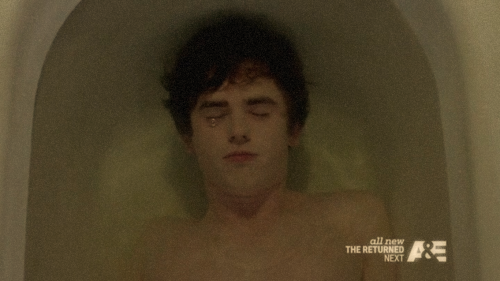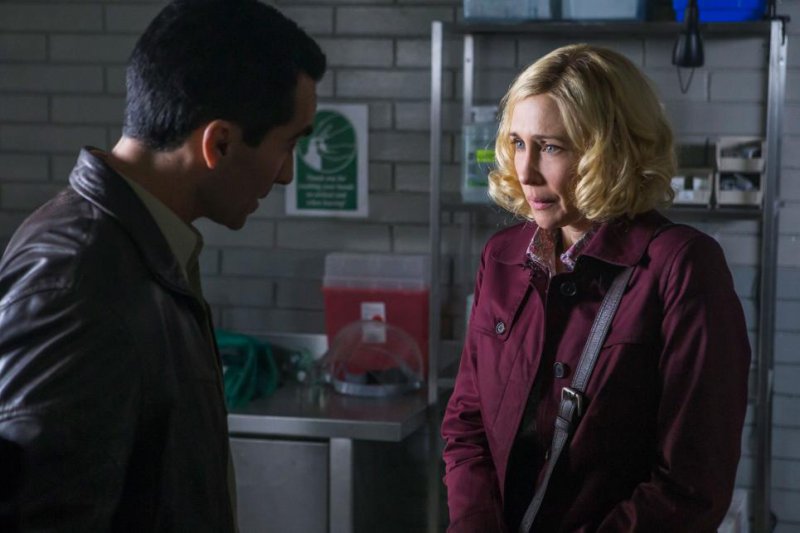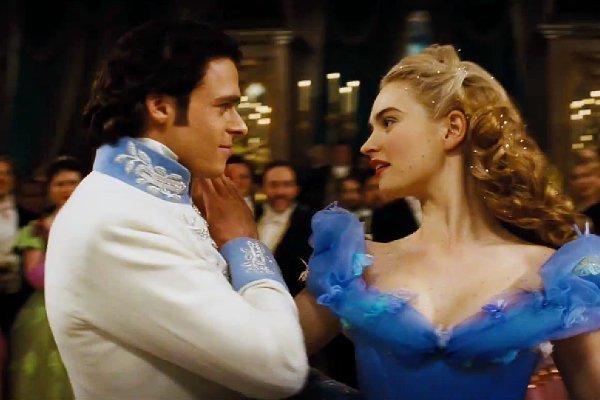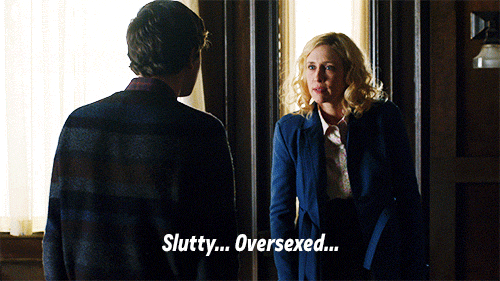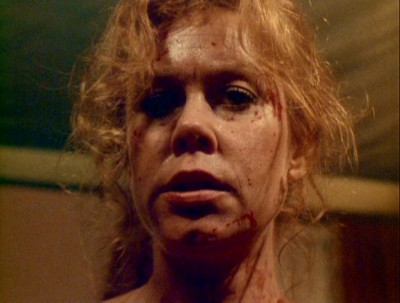BATES MOTEL: PERSUASION
Bates Gonna Trouble The Waters...
Bates Motel's Persuasion wraps up one storyline (the Annika disappearance) while giving us another one (the Annika murder). Maybe Norma Bates is right: maybe crazies just seem drawn to her. Even the relatively normal people that come her way end up connected to the loony bin she calls a motel. Persuasion gave us genuinely creepy moments, some really strong acting from the cast, and even a bit of comedy. Perhaps because we got a new mystery that may/may not tie in with the Bateses, I wasn't going all crazy for it. However, it has just enough to push it to a higher level than what came before (which was really good by the way).
Annika is still missing, the body at the end of the last episode being another girl. Norma Bates (Vera Farmiga) is still worried that her son, Norman (Freddie Highmore) is more involved than perhaps even he knows. Norman, for his part, appears to be growing in confidence in regards to his mother and the entire affair. He has no problem all but ordering her out of the room while Sheriff Alex Romero (Nestor Carbonell) asks Norman questions.
Norma has other worries besides a potentially homicidal child. She's going back to school. She gets off to a bad start with Professor James Finnegan (Joshua Leonard). Not only does she fail to realize until it's too late that he isn't a fellow student who is demanding she get up from 'his chair', but that she's in the wrong class altogether. Having signed up for Business, she somehow ends up in the Psycho-logy class (couldn't resist). Professor Finnegan recognizes a lost soul (and perhaps, has designs on our fair mother): he offers her his card, suggesting she should try therapy. At first she throws the card away, but almost immediately picks it up.
Norman for his part is still slipping in and out of reality. He is not sure whether he might have killed Annika, and "Mother" (his hallucinations of Norma) comes to give advise. He gets into the tub, and slowly slips in. Norma rescues him just before he finally drowns, but whether it is a suicide attempt (which he has done before) or merely a lapse in judgment remains to be seen.
If only she knew what her other son Dylan Massett (Max Thieriot) and his father/uncle Caleb (Kenny Johnson) are up to. They are still working to get Dylan's marijuana farm going, even if it means inadvertently dragging Emma (Olivia Cooke) into this when a pot delivery comes to the motel and she finds herself having to bring it. Dylan still doesn't trust or care for Caleb, but somehow is too soft-hearted to get rid of him.
As for Romero, he now faces the political fight of his life. Bob Paris (Kevin Rahm), the head of the Arcanum Club, wants Romero out of office and tells him in so many words. He now faces Marcus Young (Tomiwa Edun), the rival candidate for Sheriff. Romero won't back down, but he knows he's in for a bitter election.
Finally, Norma gets some good news: Annika is alive. Norma gets some bad news too: Annika is bleeding in front of her, and gives Norma a USB, telling her to use it for her and her son.
A New Mystery....
I feel so much for Norma. We see that this poor woman is really and truly doing her best and still floundering. It's as if every decision she makes, even the right one, always blows up in her face. Unlike the past, where Farmiga mined the angry side of Norma, here we see a genuine hurt and sadness within her, especially when dealing with Norman.
"I think one of us has a problem, and I'm tired of the assumption being that it's me," Norman tells his mother when he berates her for telling Romero that Norman was the last person to see Annika alive. We see in Farmiga's Norma a genuinely hurt and fearful woman, her sadness in having somehow hurt her son mixed with the realization that perhaps he might be right.
Norma Bates is a woman under siege from all fronts: family, business, personal, professional. She appears to be the President of the Secret Club of the Damaged, a term Professor Finnegan comes up to describe people who hide their deepest troubles. Bates Motel if nothing else restores Norma Bates' reputation. No longer the deranged control-freak from the original film or Psycho IV: The Beginning, Norma Bates is just a flawed woman struggling to do her best and making a fiasco out of it (sometimes by her own hand, sometimes not).
Farmiga is always excellent in Bates Motel, and nothing short of a lobotomy would alter her brilliant take on the role. Persuasion, however, also does something more: it showcases Highmore as Norman. He isn't a shrinking violet, but almost shockingly aggressive and assertive as Norman. His confidence to almost arrogance when Romero interviews him is a standout. In fact, the entire sequence is a showcase for all three: for Highmore in his cool confidence, for Carbonell in his professional but determined investigation, and Farmiga in her worry and inability to stay out of things. Highmore in particular was Farmiga's equal: his rage real and frightening, his slipping into hallucinations even more despairing.
In the subplot with Dylan and Caleb, it's still a bit out there, away from all the craziness at the motel. One hopes that this is a slow burn to a more shocking conclusion, because apart from the levity of seeing Emma (who looks amazingly hot) bringing up some pot, it's not really progressing the narrative.
The guest stars are all excellent. Leonard I figure will play a larger role as Finnegan, and in his brief scenes makes a strong impression. Same for Rohr as the kinky overlord of the Arcanum Club, who you know is up to no good. As for Edun, is Marcus a good guy, a bad guy, or something else? That too remains to be seen.
About the only real bits that were a bit disappointing was the Gunner/Emma reunion. It wasn't. These two had great chemistry, so to see it not have anything to do with each other was anticlimactic, almost a waste. I also am not jumping out of my seat thinking about this new mystery Norma is finding herself in. Poor Norma...she does attract all the wrong people.
Persuasion closes some stories, opens others. Still, Bates Motel is growing to be a weird, fantastic, excellent program that does so much with the Psycho legacy that on the whole works so well both as prequel and its own entity.
9/10
Next Episode: Unbreak-Able
